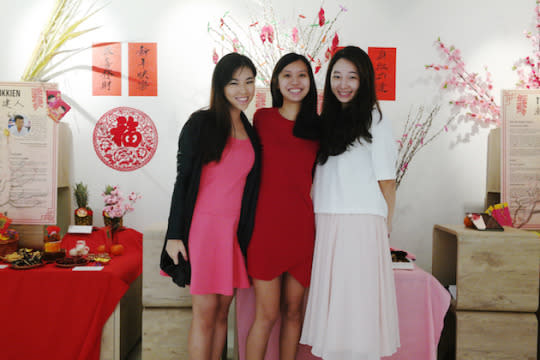Campaign to promote the use of dialects takes off

(L-R) Fiona Seah, Melissa Goh and Cherie Lim from NTU hope the My Father Tongue campaign will spur interest among younger Singaporeans to speak dialects more often (Photo: My Father Tongue)
By Kyle Malinda-White
A new campaign to promote dialect usage among younger Singaporeans is off to a good start with 16 free classes conducted in Hokkien, Cantonese and Teochew fully booked since their opening last month.
My Father Tongue is spearheaded by three students from Nanyang Technological University (NTU) who are doing the campaign as their final-year project. Fiona Seah, 25, Melissa Goh, 24, and Cherie Lim, 23, from NTU’s Wee Kim Wee School of Communication and Information, started the campaign in October last year.
The classes are held in various community centres, and most of the attendees are between 18 and 35 years old.
By coincidence, the NTU students are Teochew from their paternal side of the family while their mothers are of Cantonese heritage. They hope to promote dialects as an integral part of Singapore’s social fabric.
Their efforts appear to be paying off as the majority of the young Singaporeans that they spoke to have expressed interest in learning more about dialects.
“We thought that Singaporean youths may find dialects crude. But we realised some of them do think dialects are important to communicate with the older generation,” said Goh.
This enthusiasm is attested by the results from a survey that the students conducted last September. Some 250 youths aged 18 to 35 responded, and 82 per cent of them said they would learn dialects if given the choice.
Some of the young Singaporeans said they did not know that clan associations run dialect classes, partly because there is no online listing of such classes.
To complement the efforts of the clan associations, the students also manage the My Father Tongue’s website (www.myfathertongue.sg), which contains starter kits on Hokkien, Cantonese and Teochew. The resources include a transliteration system and audio recordings to help youths understand basic phrases such as “thank you” and “take care”.

Each dialect class conducted by My Father Tongue has been fully booked (Photo: My Father Tongue)
The students also hope to partner the clan associations, which are already active in the promotion of dialects among their respective communities.
“We hope all the clan associations could come together and promote dialects as a whole instead of doing it individually,” Goh said.
Citing the 2014 Teochew Festival, the students said the event organised by the Teochew Poit Ip Huay Kuan was a successful example of the outreach efforts by clan associations. Going forward, they hope that various clan associations can hold a multi-dialect festival.
Dialect usage has been declining partly because of the government’s efforts to promote Mandarin since the late 1970s, but the students said they understood the rationale for such a policy.
“In the past, language was a barrier for the different dialect groups. It was necessary for the government to implement a common language,” said Seah.
The students are planning more promotional activities in the coming weeks, including opening more dialect classes.
Seah believed now is the right time to bring dialects back to the mainstream of society as many young Singaporeans already have a good grasp of the official languages.
Goh agreed, saying that the students hope the campaign will spur longer-term efforts to preserve dialects for future generations.
“Dialects could be lost within our own generation. So many youngsters are taking up third languages like Korean and Japanese, so why not study their own dialect?”

